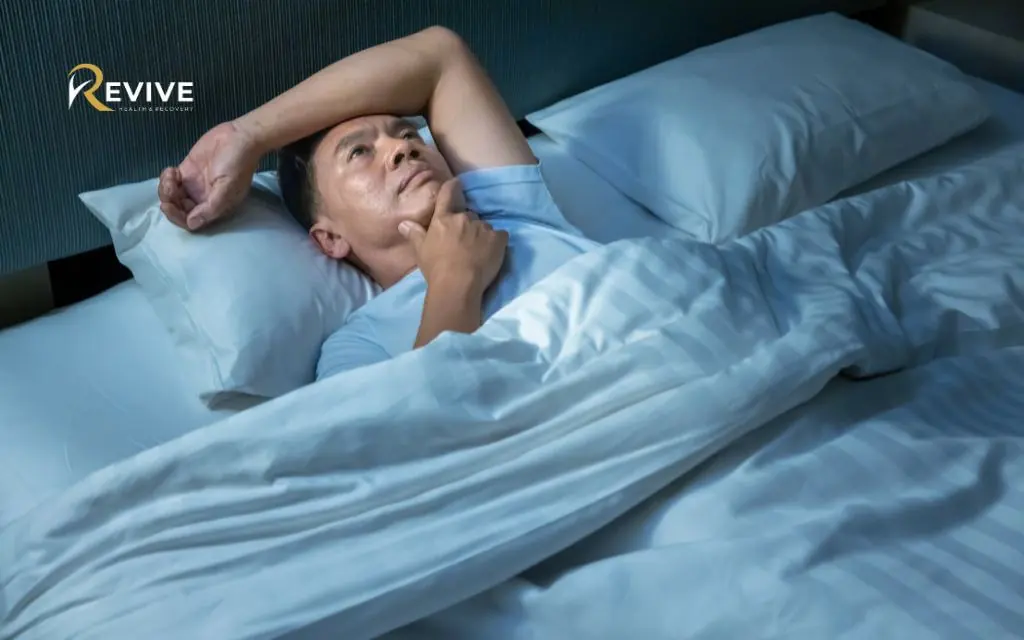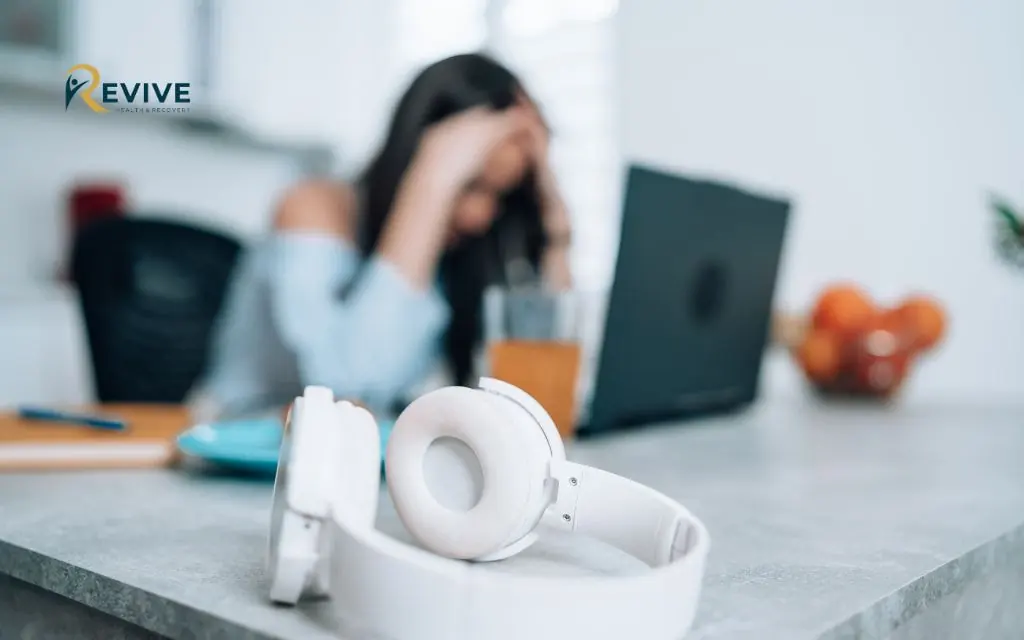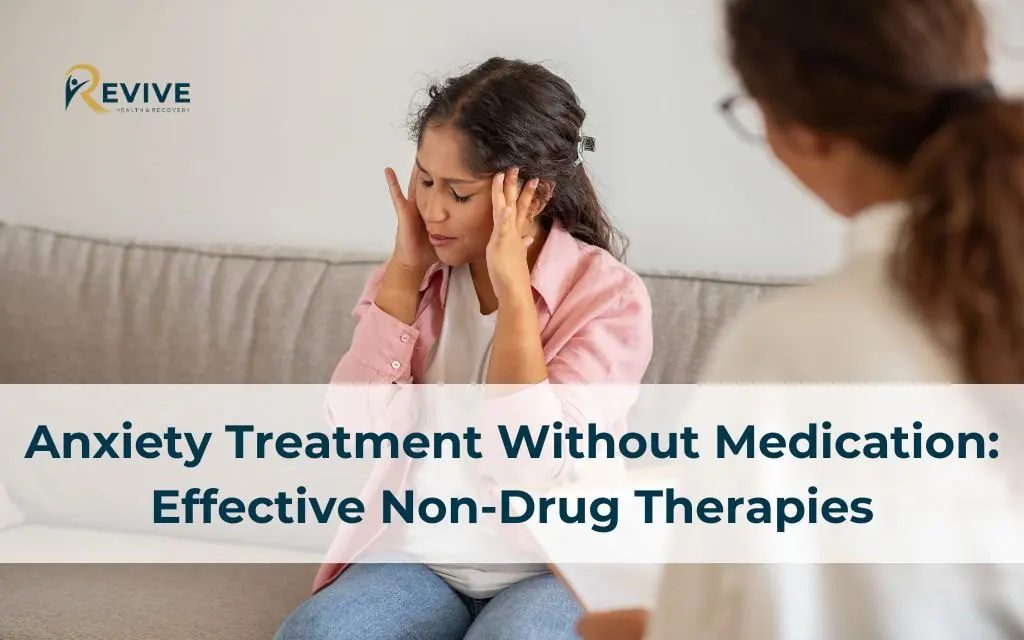Anxiety disorders affect millions of Americans, disrupting daily life and creating persistent feelings of worry and fear. While medication remains a common treatment approach, many individuals seek alternatives due to concerns about side effects, dependency, or medication costs.
At Revive Health Recovery, we understand the desire for effective, medication-free anxiety management. Our comprehensive approach integrates evidence-based therapies with lifestyle modifications to address anxiety at its root. Research consistently demonstrates that non-medication treatments provide sustainable relief with fewer complications than pharmaceutical interventions.
Looking for anxiety treatment without medication? Discover science-backed, effective alternatives that empower you to reclaim control over your mental health journey.
Why Choose Anxiety Treatment Without Medication?
Many individuals express valid concerns about medication-based treatments for anxiety:
Medical research shows that while anxiety medications can provide rapid symptom relief, they often come with drawbacks. Many patients report unwanted side effects such as drowsiness, cognitive impairment, and sexual dysfunction. Additionally, certain anxiety medications carry risks of physiological dependency and diminishing effectiveness over time.
Non-medication approaches address anxiety through behavioral changes, cognitive restructuring, and skill development rather than chemical intervention. The American Psychological Association (APA) and Anxiety and Depression Association of America (ADAA) recognize several evidence-based treatments that effectively manage anxiety without medication:
- Cognitive Behavioral Therapy (CBT)
- Exposure therapy
- Mindfulness-based interventions
- Lifestyle modifications
- Stress management techniques
These approaches help patients develop sustainable coping strategies while avoiding the challenges associated with medication management.

Benefits of Non-Medication Anxiety Treatment in Denver
Denver residents choosing non-medication anxiety treatments experience several distinct advantages:
Research demonstrates that psychological interventions like CBT produce more durable results than medication alone. While medications may work quickly, their benefits often diminish when discontinued. Therapy, however, equips individuals with lifelong skills to manage anxiety independently.
Non-medication approaches eliminate concerns about pharmaceutical side effects or drug interactions. They focus on building resilience through proven psychological techniques rather than altering brain chemistry temporarily.
The National Institute of Mental Health recommends psychotherapy as a first-line treatment for anxiety disorders, particularly for patients seeking long-term solutions. Denver’s diverse therapeutic community offers multiple evidence-based options tailored to individual needs.
Best Non-Medication Treatments for Anxiety
Talk Therapy for Anxiety – How It Works
Psychotherapy addresses anxiety by identifying and modifying thought patterns, behaviors, and emotional responses that perpetuate distress. During sessions, therapists create a safe environment where clients explore anxiety triggers, develop coping strategies, and practice new responses to challenging situations.
Modern therapy approaches incorporate neurobiological understanding of anxiety, targeting specific brain pathways involved in fear responses. As Dr. Aaron Beck, the founder of Cognitive Behavioral Therapy, discovered, changing thought patterns directly impacts emotional experiences and physical symptoms of anxiety.
The therapeutic relationship itself serves as a powerful healing mechanism. Through consistent work with a trusted provider, clients build confidence in their ability to face anxiety-provoking situations with new skills and perspectives.
Cognitive Behavioral Therapy (CBT) for Anxiety
CBT represents the gold standard in non-medication anxiety treatment, with decades of research supporting its effectiveness. This structured approach helps clients identify and challenge distorted thinking patterns that fuel anxiety.
Key components of CBT include:
- Cognitive restructuring: Identifying and modifying irrational thoughts
- Behavioral experiments: Testing anxiety-provoking situations safely
- Skills development: Learning practical techniques to manage physical symptoms
- Exposure exercises: Gradually confronting feared situations
Research from the Journal of Psychiatric Research indicates CBT achieves success rates comparable to medication for multiple anxiety disorders, with lower relapse rates following treatment completion. Studies show approximately 60-80% of patients experience significant improvement through structured CBT protocols.
Other Forms of Psychotherapy for Anxiety
Several specialized therapy approaches effectively target anxiety disorders:
Exposure Therapy systematically confronts fears through graduated exposure to anxiety triggers. This approach directly addresses avoidance behaviors that maintain anxiety disorders. For example, someone with social anxiety might progress from imagining social interactions to participating in increasingly challenging real-world social situations.
Acceptance and Commitment Therapy (ACT) combines mindfulness strategies with values-based action. Rather than eliminating anxiety, ACT helps patients develop a different relationship with anxious thoughts and feelings while pursuing meaningful life activities despite discomfort.
Dialectical Behavior Therapy (DBT) teaches emotional regulation and distress tolerance skills particularly helpful for those experiencing intense emotional states. DBT integrates mindfulness with concrete coping techniques to navigate overwhelming situations without becoming consumed by anxiety.
Natural Anxiety Relief Methods That Work
Lifestyle Changes to Reduce Anxiety
Simple yet powerful modifications to daily habits significantly impact anxiety levels:
Exercise produces both immediate and long-term anxiety reduction. Research published in JAMA Psychiatry demonstrates that regular physical activity, particularly aerobic exercise, reduces anxiety sensitivity and symptoms comparable to some medications. Even brief daily movement sessions activate the body’s natural stress-reduction mechanisms.
Nutrition directly influences brain function and anxiety regulation. Emerging research connects gut health to mental wellness through the gut-brain axis. Diets rich in whole foods, omega-3 fatty acids, and fermented products support neurotransmitter production while reducing inflammation associated with anxiety states.

Sleep hygiene practices dramatically affect anxiety vulnerability. Sleep deprivation amplifies anxiety by disrupting emotional processing in the amygdala. Establishing consistent sleep patterns, limiting screen exposure before bedtime, and creating relaxing pre-sleep routines naturally lower anxiety levels.
Mindfulness & Meditation for Anxiety
Mindfulness practices fundamentally restructure the brain’s response to stress and anxiety. Regular meditation strengthens the prefrontal cortex while reducing reactivity in the amygdala—the brain’s alarm system.
Effective mindfulness techniques include:
- Focused breathing exercises that activate the parasympathetic nervous system
- Body scan meditations to release physical tension associated with anxiety
- Present-moment awareness practices that interrupt ruminative thinking
- Progressive muscle relaxation to address somatic anxiety symptoms
Research from the Journal of Clinical Psychology demonstrates that consistent mindfulness practice creates measurable changes in brain structure and function within 8-12 weeks, resulting in improved anxiety management.
Alternative Therapies for Anxiety Relief
Complementary approaches enhance conventional anxiety treatment:
Acupuncture stimulates specific body points to regulate the nervous system and reduce stress hormones. Multiple studies show acupuncture treatments significantly reduce anxiety symptoms compared to placebo interventions.
Aromatherapy using essential oils like lavender and bergamot activates the limbic system through olfactory pathways, promoting relaxation and reducing autonomic nervous system arousal during anxiety episodes.
Mind-body practices such as yoga and tai chi integrate movement, breath awareness, and meditative focus. These approaches improve anxiety management through increased body awareness, regulated breathing patterns, and mindful attention training.
Where to Find Therapy for Anxiety Without Medication in Denver
How to Choose the Right Anxiety Therapist
Finding an effective anxiety therapist requires careful consideration:
Verify professional credentials, including state licensure and specialized training in anxiety treatment. Look for therapists with certifications in evidence-based approaches like CBT, exposure therapy, or MBCT (Mindfulness-Based Cognitive Therapy).
Review therapist profiles on platforms like Psychology Today or TherapyDen, filtering for anxiety specialization and preferred treatment approaches. Many Denver therapists offer free consultations to assess compatibility before committing to treatment.
Connect with local mental health organizations such as Mental Health Colorado or Colorado Crisis Services for reputable provider recommendations tailored to your specific needs.
Therapy Options for Anxiety Without Medication
Denver offers diverse therapy models for medication-free anxiety treatment:
| Therapy Type | Focus | Best For |
| Cognitive Behavioral Therapy | Restructuring thought patterns and behaviors | Generalized anxiety, panic disorder, social anxiety |
| Exposure Therapy | Systematic confrontation of feared situations | Phobias, OCD, PTSD |
| Acceptance & Commitment Therapy | Mindfulness combined with values-based action | Worry, rumination, avoidance behaviors |
| Dialectical Behavior Therapy | Emotional regulation and distress tolerance | Anxiety with emotional intensity or impulsivity |
Cost of Anxiety Therapy in Denver: What to Expect
Therapy costs vary based on provider experience, specialization, and practice setting:
Individual sessions typically range from $100-200 per session with private practitioners, while group therapy options provide more affordable alternatives at $30-60 per session. Many therapists offer sliding scale rates based on financial need.
Most major insurance plans cover evidence-based anxiety treatments. Colorado law requires coverage for mental health services comparable to physical health services, though coverage specifics vary by plan.
Denver residents with limited financial resources can access services through community mental health centers like Mental Health Center of Denver, university training clinics, or therapists offering pro-bono sessions.
When to Seek Professional Help for Anxiety
How to Know If You Need Professional Anxiety Treatment
While occasional anxiety represents a normal part of life, certain indicators suggest the need for professional intervention:
When anxiety persists despite self-help strategies or significantly interferes with daily functioning—including work performance, relationships, or self-care—professional treatment becomes essential. Physical symptoms like persistent sleep disturbance, muscle tension, digestive issues, or panic attacks often indicate anxiety requiring clinical attention.
Research shows early intervention prevents anxiety progression. If you find yourself avoiding important activities, experiencing persistent distress, or developing maladaptive coping mechanisms like substance use, professional guidance provides crucial support before symptoms worsen.
Finding Community & Support for Anxiety in Colorado
Community connection plays a vital role in anxiety recovery:
Denver hosts numerous anxiety support groups through organizations like NAMI Colorado and Anxiety and Depression Association of America. These peer-led groups provide understanding, shared experiences, and practical coping strategies in a non-clinical setting.

Building a personal support network of informed friends, family members, and colleagues creates safety nets during difficult periods. Many Denver organizations offer free educational workshops to help loved ones understand anxiety and provide effective support.
Online communities provide accessible support when in-person options prove challenging. Platforms like Anxiety & Depression Association of America’s online forums connect individuals with similar experiences while offering 24/7 support resources.
Revive Health Recovery: The Best Place for Anxiety Treatment Without Medication
Why Choose Revive Health Recovery for Anxiety Treatment?
Revive Health Recovery stands at the forefront of non-medication anxiety treatment in Denver:
Our center brings together licensed clinical psychologists, therapists, and holistic wellness practitioners specializing in evidence-based anxiety treatment. Our team maintains certification in gold-standard approaches while continuously incorporating emerging research into treatment protocols.
We prioritize individualized care, recognizing that anxiety manifests uniquely in each person. Treatment plans integrate appropriate therapeutic modalities with lifestyle modifications, stress management techniques, and community resources tailored to specific needs and goals.
Our comprehensive assessment process identifies underlying factors contributing to anxiety, including biological vulnerabilities, psychological patterns, and social/environmental stressors—creating targeted intervention strategies addressing anxiety at its source.
Anxiety Treatment Options at Revive Health Recovery
Revive Health Recovery offers comprehensive anxiety treatment modalities:
- Specialized CBT protocols targeting specific anxiety disorders, including panic disorder, social anxiety, GAD, and phobias
- Mindfulness-Based Cognitive Therapy combining meditation practices with cognitive restructuring techniques
- Specialized trauma-informed therapy addressing anxiety stemming from adverse experiences
- Nutritional counseling focused on anti-inflammatory diets supporting neurotransmitter balance
- Movement therapy integrating evidence-based exercise approaches for anxiety reduction
- Stress management training teaching practical techniques for daily anxiety management
FAQs About Anxiety Treatment Without Medication
Can anxiety be treated without medication?
Yes, research consistently demonstrates that non-medication approaches effectively treat anxiety disorders. Evidence-based therapies like CBT show success rates comparable to medication with longer-lasting results and fewer side effects.
Is talk therapy better than medication for anxiety?
Rather than “better,” talk therapy offers different benefits than medication. While medications may provide faster initial relief, therapy delivers more sustainable results by addressing underlying causes and teaching lifelong coping skills.
How long does CBT take to work?
Most people experience noticeable improvement within 8-12 weeks of consistent CBT practice. Research shows approximately 50% of patients achieve significant symptom reduction within 16 sessions, though individual results vary based on anxiety severity and type.
What is the success rate of non-medication anxiety treatments?
Studies indicate 60-80% of people who complete evidence-based therapy experience meaningful anxiety reduction. Success rates vary by anxiety type, with specific phobias showing highest response rates (80-90%) and more complex anxiety disorders like OCD showing more moderate but still significant improvement (50-70%).
Does insurance cover talk therapy for anxiety in Denver?
Most major insurance plans cover evidence-based anxiety treatment in Denver. Colorado’s mental health parity laws require insurers to cover mental health services at levels comparable to physical health services, though coverage specifics vary by plan.
Conclusion
Living with anxiety doesn’t mean resigning yourself to medication or continued suffering. Effective, evidence-based non-medication treatments provide sustainable relief while equipping you with lifelong anxiety management skills.
The journey toward anxiety relief begins with a single step—reaching out for professional support. At Revive Health Recovery, we combine clinical expertise with compassionate care to help you overcome anxiety and reclaim control of your life.
Contact Revive Health Recovery today at (303) 268-4655 to schedule your confidential anxiety assessment and discover how our medication-free approach can transform your relationship with anxiety. Your path to sustainable relief begins here.



